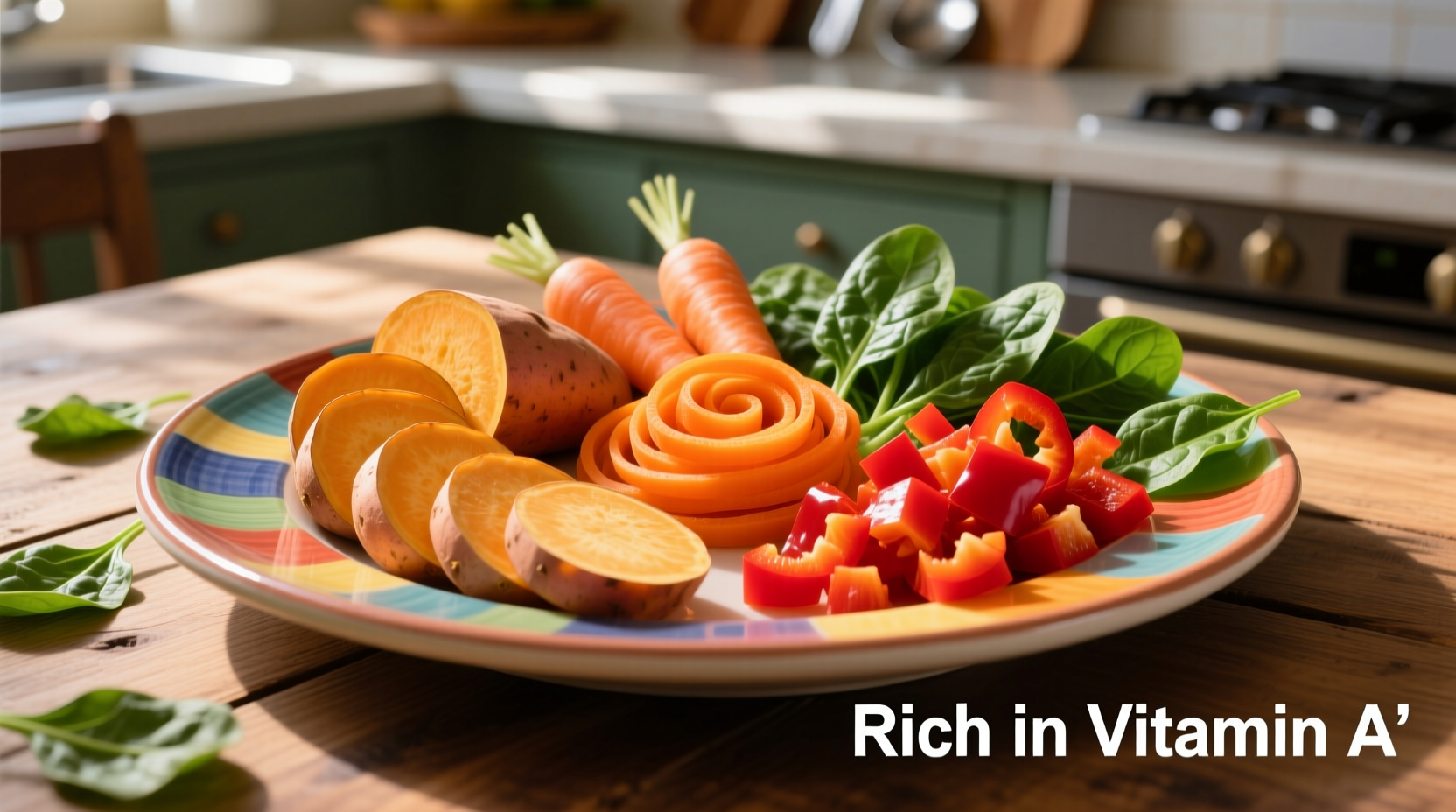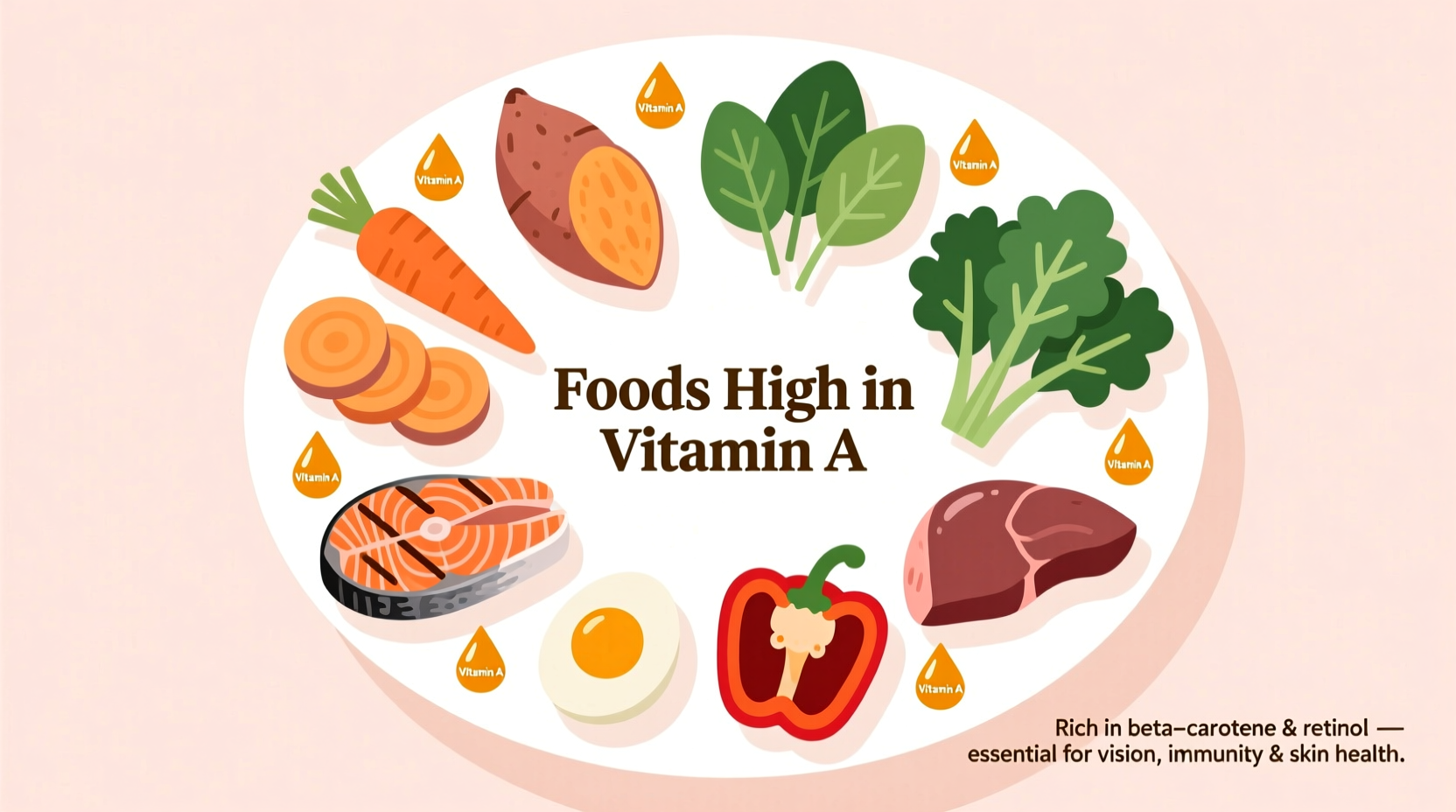Understanding where to find vitamin A in your diet is crucial for maintaining healthy vision, immune function, and skin health. Unlike supplements, getting vitamin A from whole foods provides additional nutrients that enhance absorption and utilization. Let's explore the most potent natural sources and how to incorporate them effectively into your meals.
Two Types of Vitamin A: What You Need to Know
Vitamin A isn't just one compound—it exists in two primary forms that determine which foods deliver the most benefit:
- Preformed vitamin A (retinol): Found in animal products, this is the active form your body can use immediately
- Provitamin A carotenoids: Primarily beta-carotene in plant foods, which your body converts to active vitamin A as needed
This distinction matters because your body regulates conversion from plant sources, reducing overdose risk compared to preformed vitamin A. According to the National Institutes of Health, the recommended daily allowance (RDA) is 900 mcg RAE (Retinol Activity Equivalents) for adult men and 700 mcg RAE for women.
Top Animal-Based Vitamin A Powerhouses
Animal sources provide vitamin A in its most bioavailable form. These foods deliver retinol that your body can use immediately without conversion:
| Food Source | Portion Size | Vitamin A Content (mcg RAE) | % Daily Value |
|---|---|---|---|
| Liver (beef) | 3 oz | 6,582 | 731% |
| Liver pâté | 2 tbsp | 3,810 | 423% |
| Egg yolks | 2 large | 138 | 15% |
| Salmon | 3 oz | 59 | 7% |
| Whole milk | 1 cup | 149 | 17% |
Liver stands out as the most concentrated source, but its extremely high vitamin A content means portion control matters—regular large servings could lead to toxicity. For most people, moderate consumption of eggs, dairy, and fatty fish provides beneficial amounts without risk.
Plant-Based Vitamin A Superstars
Plant foods deliver provitamin A carotenoids, primarily beta-carotene, which your body converts to active vitamin A. These sources are safer for regular consumption since your body regulates conversion based on need:
| Food Source | Portion Size | Beta-Carotene (mcg) | Equivalent Vitamin A (mcg RAE) |
|---|---|---|---|
| Sweet potato (baked) | 1 medium | 21,907 | 1,403 |
| Carrots (raw) | 1 cup | 16,706 | 1,063 |
| Spinach (cooked) | 1 cup | 14,671 | 939 |
| Pumpkin | 1 cup | 10,690 | 683 |
| Red bell peppers | 1 cup | 5,605 | 358 |
Orange and dark green vegetables dominate this list due to their high carotenoid content. Interestingly, cooking actually increases beta-carotene availability in many vegetables—studies from the USDA Agricultural Research Service show that steaming or boiling carrots can boost beta-carotene absorption by up to 600% compared to raw consumption.
Maximizing Vitamin A Absorption: Practical Tips
Simply eating vitamin A-rich foods isn't enough—you need to optimize absorption. Research published in the American Journal of Clinical Nutrition reveals these evidence-based strategies:
- Pair with healthy fats: Vitamin A is fat-soluble, so include 3-5g of fat per meal (like olive oil, avocado, or nuts) to boost absorption by up to 150%
- Combine carotenoid sources: Eating multiple carotenoid-rich foods together creates synergistic effects that enhance conversion
- Cook strategically: Lightly steam or roast vegetables rather than eating them raw for better nutrient release
- Avoid excessive alcohol: Chronic alcohol consumption impairs vitamin A metabolism and storage
For example, try roasted sweet potato wedges drizzled with olive oil and sprinkled with pumpkin seeds, or a spinach salad with avocado, carrots, and a vinaigrette dressing. These combinations significantly increase vitamin A utilization compared to eating the same foods alone.

Special Considerations for Different Needs
Certain populations have unique vitamin A requirements that affect food choices:
- Pregnant women: Should prioritize plant-based sources to avoid potential retinol toxicity while meeting increased needs (770 mcg RAE)
- Vegans and vegetarians: Need 1.5-2 times more provitamin A carotenoids due to lower conversion efficiency
- People with digestive conditions: Those with Crohn's, celiac, or pancreatic insufficiency may need preformed vitamin A from fortified foods
- Infants and children: Require careful portioning—excess liver consumption can cause toxicity in young children
The World Health Organization notes that vitamin A deficiency remains a public health concern in many regions, particularly affecting children and pregnant women in developing countries. However, in developed nations, deficiency is rare among those consuming varied diets—making strategic food choices more important than supplementation for most people.
Common Vitamin A Myths Debunked
Several misconceptions persist about vitamin A in foods:
- "Carrots give you night vision": While carrots support eye health, they won't give you supernatural vision—this myth originated from British WWII propaganda
- "All orange foods are high in vitamin A": Some orange foods like oranges themselves contain minimal beta-carotene
- "More is always better": Excessive preformed vitamin A from supplements or liver can cause toxicity, while plant sources are generally safe
- "Raw is always best": As mentioned earlier, cooking actually enhances carotenoid availability in many vegetables
Understanding these distinctions helps you make informed choices without falling for common nutritional myths that circulate online.
Building a Vitamin A-Rich Diet
Instead of focusing on single "superfoods," aim for consistent daily intake through these practical strategies:
- Start your day with scrambled eggs (with yolks) and spinach
- Include a colorful salad with carrots, red peppers, and dark greens at lunch
- Snack on carrot sticks with hummus or guacamole
- Make sweet potato the star of one dinner per week
- Add pumpkin puree to oatmeal or smoothies
This approach ensures steady vitamin A intake while providing the additional nutrients and fiber that make whole foods superior to supplements. Remember that dietary variety remains key—no single food provides all the nutrients your body needs for optimal health.











 浙公网安备
33010002000092号
浙公网安备
33010002000092号 浙B2-20120091-4
浙B2-20120091-4